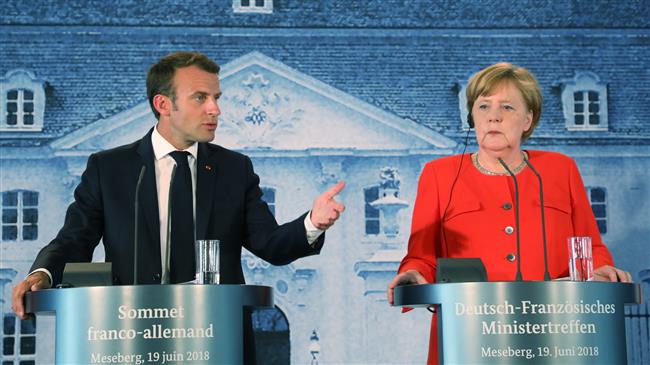Europe: German Chancellor Merkel says she and Macron ‘wrestle’ on policy issues
German Chancellor Angela Merkel said Wednesday that she and French President Emmanuel Macron “wrestle” on policy and have different outlooks, but tend to cooperate and find compromises in the end.
“Of course, we wrestle with each other,” Merkel said about relations between the core EU leaders who have disagreed recently on issues from how the bloc should handle Brexit to arms exports and climate policy.
“There are differences in mentality between us and differences in our understanding of our roles,” she added, speaking to the Sueddeutsche Zeitung and other European newspapers.
Asked whether her relationship with Macron had deteriorated in recent months, Merkel replied: “No. Not at all.”
In Paris, Macron reacted by acknowledging “fruitful confrontations” with Merkel but said they result in compromises which allow the two nations to move forward together.
“I don’t want to believe in sterile confrontations or relations,” Macron said at a press conference.
“I believe in fruitful confrontations, which means you propose something, you see how your partner responds, and together you try to find a compromise.”
He added: “What is expected of France in Europe … is to reach a compromise with Germany in order to be able to move forward. That’s our history, it’s the heart of our relationship.”
‘Find middle way’
France and Germany have traditionally been the duo at the heart of the European project and in January signed a new cooperation pact 53 years after the post-war Élysée Treaty.
However, Paris has voiced frustration that the reformist drive of Macron has been stalled by resistance from Germany, where veteran leader Merkel has been in power since 2005.
Merkel in the interview rejected the charge that she had been a brake on change in European policy.
“We always find a middle way,” the chancellor said, adding that Germany too had “launched a whole series of initiatives”, including in African development projects.
She said that “in the core questions — where is Europe going, the economy, what responsibility do we have for the climate and for Africa — we are on a very similar wavelength”.
The German leader cited as an example of Franco-German cooperation the “enormous progress” in defence policy, where “we decided to develop a fighter plane and a tank together”.
Merkel also said there had been cases of bad timing, pointing out that while Macron was pushing for major European reforms, she was engaged in half a year of coalition building after 2017 elections.
She did, however, point to different political cultures, saying: “I am the chancellor of a coalition government and much more committed to parliament than the French president, who is not even allowed to enter the National Assembly.”
(AFP)





